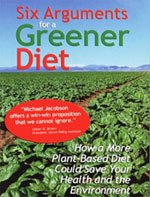Center for Communications, Health and the Environment

Six Arguments for a Greener Diet
 Following is a synopsis of Six Arguments for a Greener Diet, the Center for Science in the Public Interest’s latest book, which explains why eating fewer animal and more plant foods protects our health, planet and livestock. In keeping with CECHE’s stated mission, the synopsis focuses on human health concerns and recommendations raised in the book, and how environmental and animal welfare issues relate to them.
Following is a synopsis of Six Arguments for a Greener Diet, the Center for Science in the Public Interest’s latest book, which explains why eating fewer animal and more plant foods protects our health, planet and livestock. In keeping with CECHE’s stated mission, the synopsis focuses on human health concerns and recommendations raised in the book, and how environmental and animal welfare issues relate to them.
Americans consume more than 1 billion pounds – and 1 trillion calories – of food every day. And while research and a host of organizations, including the Center for Science in the Public Interest (CSPI), the Center for Communications, Health and the Environment (CECHE) and the federal government, tout the benefits of a diet high in fruits, vegetables and whole grains, the typical American diet remains animal-rich – and health-poor.
According to recent reports by CSPI, the United States Department of Agriculture (USDA), the American Cancer Society and other reputable sources, the current American diet is linked to a high risk of health problems, including, but not limited to, heart disease, stroke, cancer, diabetes and obesity. In addition, producing animal foods to support our present eating pattern consumes more energy, fertilizer, pesticides, water and land, and generates more pollution and greenhouse gases than growing plant foods. These environmental effects further undermine human health, and underline how dietary decisions reverberate throughout our bodies, and the world. [Read Full Lead Article]
 1. Why is eating green so important from a health standpoint? What health gains can we realistically anticipate for individuals and the population as a whole, and in what time frame?
1. Why is eating green so important from a health standpoint? What health gains can we realistically anticipate for individuals and the population as a whole, and in what time frame?
Eating a healthy plant-based diet reduces the risk of chronic diseases ranging from obesity and diabetes to heart disease and cancer. The bigger the dietary change, the greater the benefit, and the sooner it would show up. An extreme example would be that people with heart disease would enjoy immediate reductions in cholesterol levels and arterial health if they improved their diets.
2. Relative to their less nutritious/healthy counterparts, fruits and vegetables are expensive. How can they realistically be worked into the average diet, and how important is it to consume organic fruits and vegetables, which cost even more? What about canned fruits and vegetables -- are they just as healthy as fresh ones? What do the recent food scares (e.g., spinach, carrot juice, beef) mean for what you are advocating?
The fact is that brand-name processed foods are often much more expensive than fruits and vegetables, but people do need to shop carefully. Some foods, like brown rice and beans, are among the cheapest foods in the store, while meat and processed foods are among the more expensive. Canned or frozen fruits (packed in juice or water) and canned vegetables (with little or no salt) are quite healthful...though they generally don't taste nearly as good as fresh produce. Growing foods organically certainly benefits the environment due to avoidance of chemical pesticides and fertilizers, though the health benefit is probably minimal. It's worth choosing organic when you can -- and when you have the money!
The recent outbreaks of foodborne illnesses in the United States are aberrations. In general, our food supply is very safe. Though the huge farms and processors make it easier for outbreaks to be big, it is unclear how many foodborne illnesses would occur if production came from a much larger number of small farms. [Read Full Q&A with Dr. Jacobson]

Dr. Sushma Palmer, Program Director
Valeska Stupak, Editorial & Design Consultant
Shiraz Mahyera, Systems Manager
Rohit Tote, Website Consultant